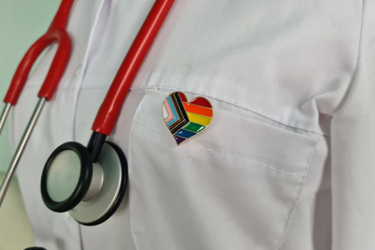Incorporating SOGI Data In Clinical Research And Impacts On Enhancing Cancer Treatment Outcomes
By Alekhya Pochiraju, Product Development Global Operations, Genentech

Clinical trials are the backbone of medical research, and they play a vital role in advancing medicine by providing the evidence necessary to determine whether a new drug, medical device, or treatment is safe and effective. Diversity in clinical trials is critical for ensuring that the safety and efficacy of new medical treatments are validated across different populations. However, clinical trials have historically suffered from a lack of diversity, which can lead to biased results and limit the generalizability of the findings. While there have been recent efforts to improve diversity of clinical trial participants, much of these efforts and discussions have predominantly focused on the important issues around racial and ethnic diversity, but there are other aspects of diversity we need to consider as well, such as looking into sexual orientation and gender identity (SOGI) cohorts.
The social and economic determinants of health, including discrimination, stigma, and inadequate healthcare access, play a role in the health disparities experienced by the lesbian, gay, bisexual, transgender, or queer (LGBTQ+) community. According to data from the Household Pulse Survey conducted by the U.S. Census Bureau, which began collecting SOGI data in July 2021, LGBTQ+ adults are more likely to experience negative health outcomes than non-LGBTQ+ adults. Addressing these disparities, along with collecting and measuring SOGI information in clinical trials, is important for several reasons.
Benefits Of And Barriers To Collecting SOGI Data
First, the demographics of the LGBTQ+ community are changing rapidly, with more individuals openly identifying as members of this community than ever before. While it is difficult to determine exact numbers, research suggests that around 4.5% of the U.S. population identifies as LGBTQ+. However, this number is likely an underestimate due to underreporting and societal stigma.
Second, collecting and measuring SOGI information in clinical trials allows for a more comprehensive understanding of the population being studied and can help researchers identify potential disparities in health outcomes. Collecting SOGI helps ensure that clinical trial recruitment is inclusive and representative of the diverse population and that all individuals receive the best possible care.
Finally, collecting SOGI information can help researchers understand the impact of interventions on specific subgroups of the population, which can lead to better health outcomes for all individuals.
There has been a growing recognition that collecting SOGI information in clinical trials could provide important insights into the experiences of individuals with cancer, particularly those who identify as LGBTQ+.
Barriers to collecting SOGI information in clinical trials:
- Stigma and discrimination: Many people who identify as LGBTQ+ have experienced discrimination and stigma in healthcare settings. For example, according to a letter published in the New England Journal of Medicine, study of 243 clinical trials cohort showed that 37 trials explicitly excluded people in same-sex relationships. This can make them reluctant to disclose their SOGI information in clinical trials, fearing that it will lead to further discrimination or stigma. As a result, researchers may not be able to obtain accurate data on the SOGI of participants, which makes it difficult to assess the impact of these factors on health outcomes.
- Lack of standardized measures: There is currently no widely accepted standard for measuring SOGI information in clinical trials. This can make it difficult to compare data across studies, which limits the ability to draw conclusions about the impact of SOGI on health outcomes. Additionally, some researchers may not be familiar with the appropriate terminology and definitions related to SOGI, leading to inconsistent data collection and analysis.
- Privacy concerns: Collecting and reporting SOGI information in clinical trials raises privacy concerns for participants. Some individuals may be hesitant to disclose this information if they are worried about the potential for discrimination or if they feel uncomfortable sharing this information with researchers. Researchers must take steps to ensure that participant privacy is protected when collecting and reporting SOGI information.
- Inadequate training: Researchers and healthcare professionals may not have received adequate training on how to collect and analyze SOGI information in clinical trials. This can lead to inaccurate data collection and analysis, as well as misunderstandings about the importance of SOGI information in healthcare settings. Inadequate training can lead to a common mistake of not routinely discussing SOGI with patients thus leading to the omission of critical health information. This can happen if a healthcare professional inadvertently uses a patient's legal name (which might not reflect their gender identity) instead of their preferred name, or if they make assumptions about a patient's gender identity without asking. Documentation of both current gender identity and sex assigned at birth is crucial for delivering appropriate care, especially to transgender patients. Many transgender patients have insurance records and identification documents that do not reflect their current name and gender identity. Not asking these questions can lead to miscommunication and a lack of patient-centered care.
SOGI And Cancer Care Disparities
Research has shown that certain cancers are more prevalent among the LGBTQ+ community, with various factors such as discrimination, stigma, and lack of access to healthcare exacerbating this. Here are some specific cancer examples where LGBTQ+ individuals may have a higher risk. These risks are not necessarily inherent to being LGBTQ+ but rather are the result of societal factors that disproportionately affect this community.
- Lung Cancer: LGBTQ+ individuals are more likely to have higher usage of tobacco products, which puts them at higher risk for lung cancer. According to a study published in the American Journal of Public Health, gay and bisexual men are more likely to smoke than heterosexual men, and lesbian and bisexual women are more likely to smoke than heterosexual women.
- Anal Cancer: Research has consistently shown that gay and bisexual men are at a higher risk for anal cancer. This is likely due to the higher rates of human papillomavirus (HPV) infection among gay and bisexual men, which is a risk factor for anal cancer. According to the American Cancer Society, gay and bisexual men are about 17 times more likely to develop anal cancer than heterosexual men.
- Breast cancer: While breast cancer is more commonly diagnosed in cisgender women, some studies suggest that lesbian and bisexual women may be at increased risk due to certain risk factors, such as higher rates of alcohol consumption, lower rates of pregnancy and breastfeeding, and lower rates of mammography screening. One study suggests that lesbian and bisexual women were 1.8 times more likely to have a breast cancer diagnosis compared to heterosexual women.
SOGI And Impact On Cancer Care
SOGI data also can help identify cancer care disparities based on a patient's SOGI. For example, studies have shown that LGBTQ+ individuals may experience discrimination and stigma in healthcare settings, which can lead to delayed or inadequate care. Additionally, transgender individuals may face barriers to accessing cancer care due to insurance coverage and provider knowledge gaps. Collecting and measuring SOGI information can help identify these disparities and lead to targeted interventions, such as LGBTQ+-affirming healthcare providers and culturally sensitive care.
- Cancer incidence: Research suggests that certain types of cancer, such as breast cancer, may occur at higher rates among lesbian and bisexual women. Therefore, collecting SOGI information in clinical trials focused on breast cancer can help researchers better understand risk factors, develop targeted interventions, and ensure that these interventions are effective for all individuals.
- Cancer diagnosis: LGBTQ+ individuals may face barriers to accessing cancer screening and diagnosis services, such as lack of insurance or discrimination by healthcare providers. Collecting SOGI information in clinical trials focused on cancer diagnosis can help researchers understand these barriers and develop interventions to address them.
- Cancer treatment: LGBTQ+ individuals may face unique challenges related to cancer treatment, such as concerns about hormone therapy for transgender individuals or the impact of cancer treatment on sexual function for gay and bisexual men. Collecting SOGI information in clinical trials focused on cancer treatment can help researchers understand these challenges and develop interventions to address them.
- Cancer survivorship: LGBTQ+ cancer survivors may face unique challenges related to survivorship, such as mental health issues related to social isolation or lack of support from family and friends. Collecting SOGI information in clinical trials focused on cancer survivorship can help researchers understand these challenges and develop interventions to support LGBTQ+ survivors.
Potential solutions to address these barriers:
- Education and training: Researchers and healthcare professionals should receive education and training on the appropriate terminology and definitions related to SOGI, as well as strategies for collecting and analyzing SOGI information in clinical trials. This can help to ensure that data is collected accurately and consistently across studies.
- Standardized measures: Developing standardized measures for collecting and reporting SOGI information in clinical trials can help to ensure that data is comparable across studies. This can facilitate the identification of patterns and trends related to SOGI and health outcomes.
- Privacy protections: Researchers must take steps to protect participant privacy when collecting and reporting SOGI information in clinical trials. This can include using anonymous surveys and ensuring that data is stored securely.
- Addressing stigma and discrimination: Researchers and healthcare professionals must work to create a welcoming and inclusive environment for LGBTQ+ individuals in healthcare settings. This can include providing training to healthcare professionals on how to provide culturally competent care and addressing discrimination and stigma when it occurs.
Future Forward: To Be Counted Is To Be Included
There are a number of barriers that can make it difficult to obtain accurate data on SOGI. Addressing these barriers will require education and training for researchers and healthcare professionals, the development of standardized measures, privacy protections, and efforts to address stigma and discrimination in healthcare settings.
Genentech Patient Foundation has adopted SOGI collection, and U.S. study teams are piloting SOGI collections in their trials. SOGI data collection is and should remain optional and self-reported and in accordance with clinical site location and local regulations. These data collection approaches can begin by having broader gender identity and sexual orientation information that go beyond typical male/female to include options that collect sexual orientation data with options such as heterosexual, lesbian, gay, bisexual, queer, questioning, other, and prefer not to answer. The recommendation is also to gather gender identity data that include cisgender male, cisgender female, transgender male, transgender female, non-binary, other, and prefer not to answer as options.
Collecting and measuring SOGI information in cancer care and clinical trials is critical to ensuring equitable and effective care for all individuals, particularly as LGBTQ+ demographics continue to evolve. It can help healthcare providers tailor cancer screening and prevention recommendations, addressing higher incidence of certain cancers in the LGBTQ+ population, identify and overcome barriers to care, increase diversity and inclusivity in clinical trials, and develop tailored interventions to improve the quality of life and treatment effectiveness for LGBTQ+ individuals.
About The Author:

Alekhya Pochiraju is a senior lead in clinical operations, product development at Genentech, where she provides clinical oncology operations expertise and advocates for health equity in clinical trials. She believes, with the future of healthcare geared toward personalized medicine, biomarkers are a critical element of cancer drug development and cancer therapeutics. Her recent talk at SCOPE US, Biomarkers & Precision Medicine USA Congress and Salesforce Women's Summit, focused on health equity disparity among minorities and people of color. Prior to joining Genentech, Alekhya worked in quality technology at Fluidigm and Sanofi-Genzyme. Alekhya holds a master's degree from Northeastern University in biotechnology.
